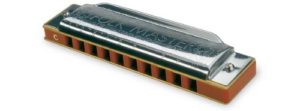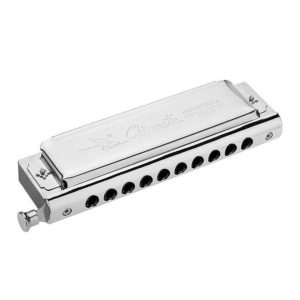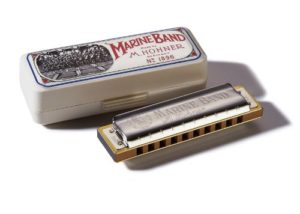Are you looking for the best harmonica for beginners? You’re in the right place.

Learning a new instrument is an amazing and fun endeavor, but it’s not fun figuring out what brand of instrument you should buy.
In this buyer’s guide, we will look at some beginner harmonica brands and see which ones are a better purchase.
Top 4 Best Harmonicas for Beginners:
| Image | Model | Price |
|---|---|---|
 | Suzuki HA-20-C (Editor's Choice) | Check Price |
 | Suzuki 1072-C | Check Price |
 | Swan 10/40 Chromatic Harmonica | Check Price |
 | Hohner Marine Band Harmonica | Check Price |
Suzuki HA-20-C (Editor’s Choice)

Now we will take a look at a few different harmonica brands. We will look at the Suzuki 1072-C Folkmaster, the SWAN harmonica in C, the Hohner Marine Band harmonica, and the Suzuki HA-20-C Promaster Hammond harmonica.
I will list some pros and cons, and hopefully, this will help you decide what harmonica is best for you.
The first harmonica that we will take a look at is the Suzuki HA-20-C Promaster Hammond harmonica. It’s in the key of C.
It has bronze reeds and includes a hard shell carrying case. The instrument weighs 1 pound, so it’s not cheaply made if you wonder why it cost more than the others. It’s made in Japan.
This instrument has a beautiful sound and is beautifully manufactured. It is made of brass, and the comb is aluminum, so the instrument is very durable and lasts a while.
It’s easy to play as a beginner, but, in my opinion, it sounds like a professional one. Overall, I can highly recommend this instrument.
Overall, I can highly recommend this instrument.
Pros
- Metal body and comb
- Key of C
- Great quality sound
- Durable case
- Good solid projection; will play loud
- Heavier weight; solid instrument that will last
Cons
- Cost a little more, but great value
Suzuki 1072-C Harmonica
The second harmonica we will look at is the Suzuki 1072-C Folkmaster. It’s a 10-Hole harmonica in the key of C.
It is made of plastic, has metal covers on both sides, and includes a hard shell carrying case. Weights about 2.9oz, so very light. It is manufactured in China.
This harmonica got good responses in product reviews. Almost every customer said the instrument was easy to get a sound out of. They liked that the case was durable.
Instrument appearance does not look cheaply made for such a low price. Good quality sounds, and after breaking in the reed, you can do bends and get more response from the instrument.
The tuning of the instrument is slightly off, but it is good for beginners, and if you choose to stay on that harmonica, you can later buy a better one. There also may be a little air leakage while playing. Overall, not bad for a lower price.
Pros
- Affordable
- Good sound quality
- Good reed response after you break it in
- Durable case
Cons
- Lightweight
- Plastic body and reed
- Not very loud sounding
- Tuning of the instrument may be slightly off by a little
- May have some air leakage while playing
Swan 10/40 Chromatic Harmonica
The next harmonica we will take a look at is the SWAN harmonica. This instrument is stainless steel and plastic. It has a plastic body and brass reeds.
It also includes a slide on the body of the harmonica. This instrument is in the key of C. Weights about 11.2oz, so a bit more solid.
I was pleasantly surprised at the quality and sound of this instrument for such a low price. It’s not a professional harmonica, but it has great quality sound and looks nice.
Slide worked really nice when doing bends. However, the case is a type of cardboard with padding inside, so you may want to get a better case if you don’t like the one that’s included. Overall, good quality instrument.
Pros
- Brass reeds
- Good quality sound
- Affordable
- Heavier weight
- Good manufacture. Bodywork is good
- Good working slide
- Good intonation
Cons
- Cheap case
Hohner Marine Band Harmonica
The next harmonica we will take a closer look at is the Hohner Marine Band harmonica. This instrument is a bit more expensive than the previous ones.
It has a wood reed comb inside and brass reed plates attached. Pear Wood Body. It comes in a protective case and weighs about 2.9oz, so heavier in weight.
It is made in Germany, which is good in this particular case.
This harmonica got a lot of great reviews. Many people loved the quality sound that comes from a wood reed.
The wood sounds better than plastic. The only low was that a couple of customers had problems breaking the harmonica reeds because they blew it too hard.
The brass reed plate may stick out just a little, but the sound is still perfect; it’s a very loud and clear-sounding instrument.
Pros
- Great sound
- Wood reed
- Durable case
- Nicely manufactured instrument
Cons
- The brass plate may stick out a little
- The reed may break if you blow extremely hard
Buyer’s Guide to Purchasing a Good Harmonica
Here are a few things you should look at when purchasing a harmonica:
Wood and Metal vs. Plastic
All harmonicas are made of either wood and metal or plastic and metal. Harmonicas work with what is called a reed on the inside. You blow in the sound holes, and the air makes the reed vibrate to produce sounds.
Wood reeds bend easier than plastic, and they make a better sound. Metal reeds are good too. They last longer, but it can take a few plays first to break in your reed. After that, you are set for a while.
A Good Weight
A good harmonica won’t be paper light. The lighter the harmonica, the cheaper quality it is made of and won’t sound good. It is a toy. If you are serious about buying a harmonica, you want to pay more than $10 for a decent quality instrument.
Key of C or G
Most harmonicas come in the key of C. That means when you tune, you don’t have to transpose your note.
If you play a C on the keyboard to tune, then you play C on your harmonica. If you have a G harmonica, you will transpose if you play a C on the keyboard to tune your note on harmonica three notes above what you played.
You can now use digital tuners, so it wouldn’t matter which kind of a harmonica you chose.
Multi-Colored Instruments
Now more than ever, you will see companies shifting to designing instruments that come in various colors instead of the traditional colors they were made to be. You can get an instrument in lime green, pink, blue, or yellow.
They did that to attract the kids to their brand. What child wouldn’t want to buy a colored harmonica? I would recommend for harmonica that you get a combination of the wood, silver, or gold-looking instrument.
If the student is playing for fun and isn’t going to take it seriously, then if you want a colored instrument, that would be ok.
After comparing a few instruments that you find, take a minute to see the differences and similarities. Find the options that you feel would be better for you.
Most of these harmonicas are made in China or Japan.
So, What’s the Best Harmonica for Beginners?
Overall, I think that all of these harmonicas are good for beginners. If I were to recommend any brand, it would be the Suzuki HA-20-C. It cost a little more than the others, but the sturdy build and metal body and combs will last much longer.
If you take care of the instrument, you can manage the purchase and keep it as long as possible. If you don’t want to pay that much for your first harmonica, perhaps you would want to look at getting the SWAN or the Hohner Marine Band harmonica.
Just remember, for the SWAN, you might want to get another case for your instrument. The SWAN has a plastic body but metal reed. That is good. If you prefer to do your bends manually, you would want the SWAN for the slide.
Now the Hohner has wood reed and is in the Key of G, but remember, you can use a digital tuner now, so that wouldn’t matter. The wood reed will sound much better; don’t blow extremely hard.
If you are a beginner, I anticipate you won’t blow too hard. These three harmonicas were better built and had the best sound quality.
If you want to buy the first one I listed to get a feel for the instrument before deciding to be fully dedicated, that is fine. You would need to get another better instrument later.